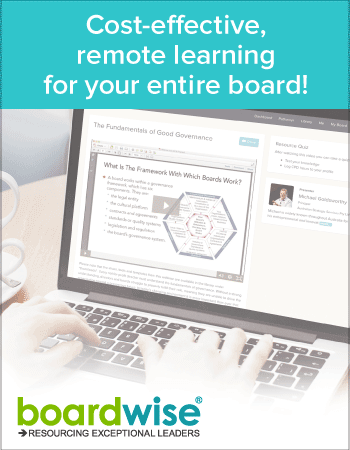finance
The Funding Conundrum
Published: August 13, 2018
Read Time: 5 minutes

The board of a not-for-profit organisation is ultimately responsible for the organisation, its impact and its activities. But what does this really mean? Many directors find it difficult to understand their responsibilities and often seek clarification, especially with respect to their role in ensuring financial sustainability and the part they play in fundraising and building organisational profile.
Board directors are responsible for governing in line with their legal and fiduciary duties. Good governance requires boards to ratify a strategy that will ensure impact is delivered, underpinned by a robust financial framework. So why are so many directors reluctant to talk about finance and funding and the role they could play in building both financial sustainability and organisational profile?
Some directors don’t see it as their role and prefer to delegate it to executive management, others don’t feel informed enough to play a role, and others choose to bury their heads in the sand.
But here’s the thing. Just because a director chooses not to personally contribute financially or feels they don’t have the skills to raise funds, does not mean they can take a backseat around the boardroom table when discussing financial sustainability and fundraising. Each director needs to make a commitment to understanding the financial position of the organisation it serves, its funding mix and the art and science of fundraising. And then be prepared to have active conversations around these topics.
And here is why. Not-for-profit organisations are receiving a tax benefit to deliver against their mission and as a return on this investment, boards must take seriously their organisation’s right to continue to exist. Any donors or funders are investing in improved outcomes, and they too want to know that boards understand and review these themes.
A little less harsh than the much talked about ‘Give, Get or Get Off’ approach, is the ‘Give, Get, or Get Strategising’ approach. Meaning Give (donate personally), Get (agree to raise money from others), or Get Strategising (if not able or willing to give or get, then agree as a board on a strategy that focuses on financial sustainability and work out how directors can help contribute to strengthening the bottom line through fundraising, new contracts, revenue generation or market diversification, etc).
How Much is too Much?
We also see boards too focused on fundraising, and that brings with it its own set of challenges. Firstly, it is time consuming to raise funds and this can detract from a board’s ability to govern and interrogate other challenges and opportunities at play. It can also conveniently distract directors from having the fierce conversations that are sometimes required.
Secondly, when board directors are preoccupied by fundraising, sometimes the board as a whole lose sight of the bigger strategic ‘income’ picture, overlooking key considerations like achieving the optimal funding mix, the ratio of discretionary vs. tied funding, and the question around whether the funds are tied to activities aligned to organisational purpose and the appropriate beneficiaries. Phil Butler from the Australian Institute of Company Directors notes that for many organisations in the not-for-profit sector, successful fundraising represents the majority of the organisation’s income and is often the difference between success and insolvency. “Of course,” says Phil, “There is everything in between on this continuum. Knowing where your organisation sits on this line may assist in determining how much fundraising experience is required on the board (or made accessible to the board), and ultimately supports good governance”. Directors need to be educated and making informed decisions about what is needed to achieve the right balance for their specific circumstance.
A few things to consider…
-
Don’t allow directors to ignore, overlook or not participate in discussions around financial sustainability and fundraising (if applicable); it’s a joint responsibility and should always be on the agenda;
-
Understand that a funding/fundraising strategy is a critical element of an effective strategic governance framework. Ensure it is clear and consistent and is well understood by both the board and the executive team;
-
Communicate regularly with the executives responsible for revenue generation, philanthropy and fundraising, and enable and value their contribution;
-
Ensure that directors understand that fundraising is not simply asking for money in a vacuum. Recognise that there is an art and science to fundraising. Understand that the elements that underpin effective fundraising including clarity of mission, impact measurement, power of the network, and quality storytelling;
-
Empower directors in the skills of fundraising and tell the story of the organisation grounded in its purpose, overlayed with their individual connectivity to the cause making it easy for them to GIVE and GET using simple and accessible language;
-
Consider establishing a sub-committee of the board where specific directors are responsible for leading the board and the organisation in its pursuit of financial sustainability;
-
Ensure that the recruitment and selection process for board directors addresses the role of the board in ensuring financial sustainability. Agree on explicit expectations of what this means for each board appointment. Resist making assumptions about abilities and skills based on the financial success of potential directors; assess their suitability holistically; and
-
Consider appointing a professional fundraiser to the board or accessing one who can inform your board’s fundraising strategy. Fundraising has emerged as a professional discipline and the opportunity for organisations to engage fundraising professionals in governance has never been greater.
Share this Article
Recommended Reading
Recommended Viewing
Author
-
Executive Director
People for Purpose
- About
-
Melissa is a specialist governance advisor working with Boards and Directors on governance performance improvement for for-purpose organisations. Melissa brings her cross-sector knowledge and expertise to support Boards to consolidate their foundation and purpose, align stakeholders, and improve their risk management and governance practices. Melissa has a depth and breadth of sector knowledge having worked with close to 100 organisations across diverse cause areas, large and small, on improving leadership and governance across strategy, risk, purpose, impact and processes. Melissa is well respected for her blend of energy, passion and ability and regularly presents on aligning people and purpose, and good governance. Melissa has presented for Better Boards Australasia, Australian Institute of Company Directors, Philanthropy Australia, and Third Sector People to name a few.
Found this article useful or informative?
Join 5,000+ not-for-profit & for-purpose directors receiving the latest insights on governance and leadership.
Receive a free e-book on improving your board decisions when you subscribe.
Unsubscribe anytime. We care about your privacy - read our Privacy Policy .










